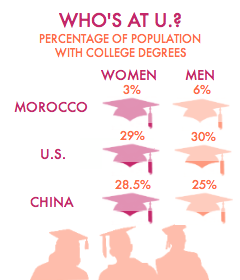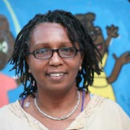
January 21, 2013 | Education
Breaking Through
Rita Conceicao brings dignity, education and jobs to Brazil's overlooked.

For young black women living in the shantytowns of Salvador, Brazil, there used to be two traditional career options: maid or prostitute. Growing up there, Rita Conceicao was determined to find a different path for herself.
Against the odds she excelled at school—despite having to ride a public bus an hour each way—and even more improbably went on to earn a university degree. And then, instead of leaving the slums behind, she returned to found two groundbeaking organizations.
What was it like for you as a child in Salvador?
Salvador is a city of 3 million inhabitants; 80 percent of them are African-Brazilian. The city has the highest concentration of blacks outside of Africa. The life of these inhabitants is to struggle to overcome the poverty in which they live.
I grew up the daughter of a domestic maid and a security guard, the first of eight children. I started my schooling at a neighbor’s house because, at that time in Brazil, there were no public schools or daycares where the children of the poor could learn. My mother could not sign her name, but it was still her dream for me to attend college and study law so that I would not have a limited future of working as a servant, or filling myself with children without the means to raise them. My mother paid the neighbor a small amount to teach me how to read and write.
It took you 12 years to get your university degree. How did you keep going?
When I started university, I did not understand the responsibility that getting in brought me. Of the 40 spaces that were open, I was the only black person. I did not have a strong command of formal written Portuguese, scientific language, or a good preparation in math or statistics. I felt a sensation of incompetence. I was also very rebellious. I wanted to run away from the responsibility of attending university.
My mother's death in 1984 left my father alone to raise my siblings, and I needed to work to help support my family. I felt this opportunity slipping away-- this great dream of my family's and my mother's. I felt like I was at the bottom of a big hole, and I had one chance to pull myself up. Because I was the reference point for all of my brothers and sisters, I couldn't fail. In 1992, I finally received my diploma in social sciences with a specialization in anthropology.
Why did you start your first nonprofit, Bahia Street?
I wanted to help poor girls like me. I only made it to university because my mother and other women saw potential in me and supported me as I went through school. Salvador is filled with girls who want to achieve an education and stay in university once they gain entrance and yet can't because of the many barriers that stand in their way. Bahia Street removes these obstacles, clearing the path for poor African-descent girls trying to achieve their dreams.
I wanted to create a space in which girls could receive the same teaching and mentoring that I received in my childhood neighborhood within a structured environment that connected them to each other around concepts of citizenship.
Why did you feel the need to also start Sou Digna?
While Bahia Street achieved great success educating girls ages 6 to14 for university, increasingly women— sometimes the mothers or sisters of Bahia Street students— were coming to the center asking for help. Many of them had never completed school, had never held a job in the formal economy (working as maids or street vendors), and they suffered from low self esteem that comes from the poverty and violence all around them. Sou Digna, started in 2011, extends the range of programs that we offer at our Center to women ages 18 and over, providing university entrance support, job training, and citizenship classes.
What do you see as the greatest accomplishments of these two organizations?
Together, Bahia Street and Sou Digna have created a women's center that provides education, training, and community-building for females ages six through adulthood. Bahia Street has accompanied hundreds of girls through a middle school education and at least 30 to university entrance. It has inspired many community-based projects developed by its alumni and teachers. Sou Digna has trained more than 100 women in technology and cake-baking, a trade which allows women to earn additional income quickly and without significant investment.
What are the biggest problems still facing women in the slums?
Lack of self respect. They suffer from low self-esteem and depression. But from the moment that you have access to education, you are stronger.
Have things changed for women in Brazil since the country elected a woman president?
Dilma Rousseff's election is very symbolic. We are coming from a place of such low horizons that we can start to imagine women being able to rank in the bigger picture. We have a lot of work to do in the future. More women need to become president of Brazil. But with all of the discrimination that women have against them, the election of Dilma breaks the rule that women don't have the capacity to lead.